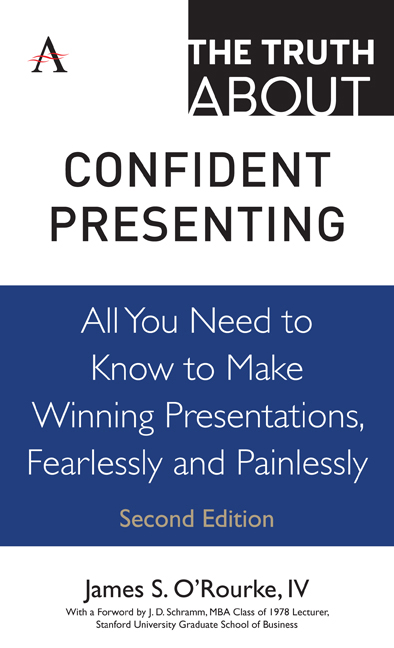 The Truth about Confident Presenting
The Truth about Confident Presenting Book contents
- Frontmatter
- Contents
- Foreword
- Introduction
- Part I Some Initial Truths
- Truth 1 Public speaking is not easy, but it's certainly doable
- Truth 2 The key to success is preparation
- Truth 3 Rehearsal is essential
- Truth 4 Emulating good speakers makes you better
- Truth 5 Establish goals for your presentation
- Truth 6 A presentation is a learning occasion
- Part II The Truth About Getting Ready to Speak
- Part III The Truth About What Makes People Listen
- Part IV The Truth About Developing Support for Your Presentation
- Part V The Truth About Getting Up to Speak
- Part VI The Truth About Managing Anxiety
- Part VII The Truth About Nonverbal Communication
- Part VIII The Truth About Visual Aids
- Part IX The Truth About Handling an Audience
- Part X The Truth About What Makes a Presentation Work
- References
- Acknowledgments
- About the Author
Truth 2 - The key to success is preparation
from Part I - Some Initial Truths
- Frontmatter
- Contents
- Foreword
- Introduction
- Part I Some Initial Truths
- Truth 1 Public speaking is not easy, but it's certainly doable
- Truth 2 The key to success is preparation
- Truth 3 Rehearsal is essential
- Truth 4 Emulating good speakers makes you better
- Truth 5 Establish goals for your presentation
- Truth 6 A presentation is a learning occasion
- Part II The Truth About Getting Ready to Speak
- Part III The Truth About What Makes People Listen
- Part IV The Truth About Developing Support for Your Presentation
- Part V The Truth About Getting Up to Speak
- Part VI The Truth About Managing Anxiety
- Part VII The Truth About Nonverbal Communication
- Part VIII The Truth About Visual Aids
- Part IX The Truth About Handling an Audience
- Part X The Truth About What Makes a Presentation Work
- References
- Acknowledgments
- About the Author
Summary
Effective preparation for a presentation involves more than practice, but it's all relatively easy if you take it step-by-step.
In the fourth century BC, the Greek philosopher Aristotle gathered his students around him near the city of Athens and passed along a small bit of wisdom: things will go better during a speech if you're properly prepared. In a collection of his lectures, passed by oral tradition for many years and later written down as his Rhetoric, Aristotle explains that three considerations are particularly important for every speaker: audience, purpose and occasion.
Audience clearly comes first. A presentation is all about them. It doesn't matter what you want. It doesn't matter how interesting, important or powerful you think your message is. All that really matters is what the audience wants. If you can't deliver a presentation that they find interesting, engaging, useful, valuable or worth thinking about, then your audience will ignore you. They may be polite, of course. They may nod, smile and appear to be interested, but deep inside, they're thinking about something else. They're tuned in to their own needs and interests, not yours. You must figure out what they want or need and give it to them. Your reward is their undivided attention and, perhaps, the behavior you're hoping for.
Your purpose matters, as well. Consider these questions: Why are you speaking to this group, on this occasion, about this topic? What's your reason for being here? You may think it's to sell them a product, a concept or an idea. You may have something in mind for the audience to do (or stop doing). But your purpose is subtler than that. You should know what your intended outcome is. Aristotle gives three reasons why a speaker might address an audience: to inform, to persuade, or to inspire. Some presentations call for all three; others focus on just one. What you choose to do depends on the outcome you envision for this particular audience.
Distinguish between informative and persuasive purposes as you prepare. If your purpose is to inform, you can't become an advocate on behalf of one point of view, nor can you gratuitously toss in your 2 opinions along the way.
- Type
- Chapter
- Information
- The Truth about Confident PresentingAll You Need To Know To Make Winning Presentations, Fearlessly And Painlessly, pp. 5 - 8Publisher: Anthem PressPrint publication year: 2019


